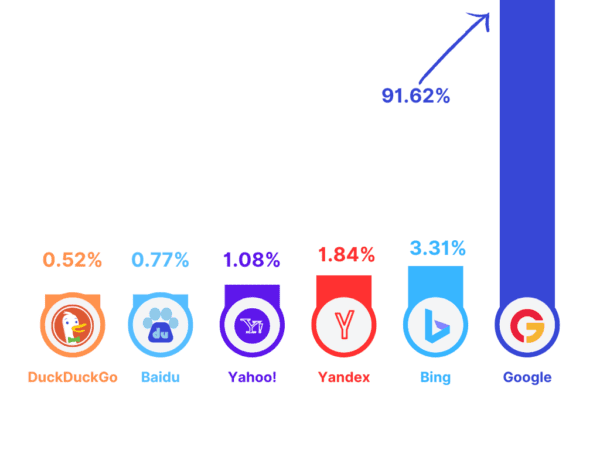SEO in 2026: Key predictions from Yoast experts
If there’s one takeaway as we look toward SEO in 2026, it’s that visibility is no longer just about ranking pages, but about being understood by increasingly selective AI-driven systems. In 2025, SEO proved it was not disappearing, but evolving, as search engines leaned more heavily on structure, authority, and trust to interpret content beyond the click. In this article, we share SEO predictions for 2026 from Yoast SEO experts, Alex Moss and Carolyn Shelby, highlighting the shifts that will shape how brands earn visibility across search and AI-powered discovery experiences.
Key takeaways
- In 2026, SEO focuses on visibility defined by clarity, authority, and trust rather than just page rankings
- Structured data becomes essential for eligibility in AI-driven search and shopping experiences
- Editorial quality must meet machine readability standards, as AI evaluates content based on structure and clarity
- Rankings remain important as indicators of authority, but visibility now also includes citations and brand sentiment
- Brands should align their SEO strategies with social presence and aim for consistency across all platforms to enhance visibility
A brief recap of SEO in 2025: what actually changed?
2025 marked a clear shift in how SEO works. Visibility stopped being defined purely by pages and rankings and began to be shaped by how well search engines and AI systems could interpret content, brands, and intent across multiple surfaces. AI-generated summaries, richer SERP features, and alternative discovery experiences made it harder to rely solely on traditional metrics, while signals such as authority, trust, and structure played a larger role in determining what was surfaced and reused.
As we outlined in our SEO in 2025 wrap-up, the brands that performed best were those with strong foundations: clear content, credible signals, and structured information that search systems could confidently understand. That shift set the direction for what was to come next.
By the end of 2025, it was clear that SEO had entered a new phase, one shaped by interpretation rather than isolated optimizations. The SEO predictions for 2026 from Yoast experts build directly on this evolution.
2026 SEO predictions by Yoast experts
The SEO predictions for 2026 shared here come from our very own Principal SEOs at Yoast, Alex Moss and Carolyn Shelby. Built on the lessons SEO revealed in 2025, these predictions focus less on reacting to individual updates and more on how search and AI systems are evolving at a foundational level, and what that means for sustainable visibility going forward.
TL;DR
SEO in 2026 is about understanding how signals such as structure, authority, clarity, and trust are now interpreted across search engines, AI-powered experiences, and discovery platforms. Each prediction below explains what is changing, why it matters, and how brands can practically adapt in the coming year.
Prediction 1: Structured data shifts from ranking enhancer to retrieval qualifier
In 2026, structured data will no longer be a competitive advantage; it will become a baseline requirement. Search engines and AI systems increasingly rely on structured data as a layer of eligibility to determine whether content, products, and entities can be confidently retrieved, compared, or surfaced in AI-powered experiences.
For ecommerce brands, this shift is especially significant. Product information such as pricing, availability, shipping details, and merchant data is now critical for visibility in AI-driven shopping agents and comparison interfaces. At the enterprise level, the move toward canonical identifiers reflects a growing need to avoid misattribution and data decay across systems that reuse information at scale.
What this means in practice:
Brands without clean, comprehensive entity and product data will not rank lower. They will simply not appear in AI-driven shopping and comparison flows at all.
Also read: Optimizing ecommerce product variations for SEO and conversions
How to act on this:
Treat structured data as part of your SEO foundation, not an enhancement. Tools like Yoast SEO help standardize the implementation of structured data. The plugin’s structured data features make it easier to generate rich, meaningful schema markup, helping search engines better understand your site and take control of how your content is described.
A smarter analysis in Yoast SEO Premium
Yoast SEO Premium has a smart content analysis that helps you take your content to the next level!
Prediction 2: Agentic commerce becomes a visibility battleground, not a checkout feature
Agentic commerce marks a shift in how users discover and choose brands. Instead of browsing, comparing, and transacting manually, users increasingly rely on AI-driven agents to recommend, reorder, or select products and services on their behalf. In this environment, visibility is established before a checkout ever happens, often without a traditional search query.
This shift is becoming more concrete as search and commerce platforms move toward standardised ways for agents to understand and transact with merchants. Recent developments around agentic commerce protocols and Universal Commerce Protocol (UCP) highlight how AI systems are being designed to access product, pricing, availability, and merchant information more directly. As a result, platforms such as Shopify, Stripe, and WooCommerce are no longer just infrastructure. They increasingly act as distribution layers, where agent compatibility influences which brands are surfaced, recommended, or selected.
What this means in practice:
In 2026, SEO teams will be accountable for agent readiness in much the same way they were once accountable for mobile-first readiness. If agents cannot consistently interpret your brand, product data, or availability, they are more likely to default to competitors that they can understand with greater confidence.
How to act on this:
Focus on making your brand legible to automated decision systems. Ensure product information, pricing, availability, and supporting metadata are clear, structured, and consistent across your site and feeds. This is not about optimising for a single platform or protocol, but about reducing ambiguity so AI agents can accurately interpret and act on your information across emerging agent-driven discovery and commerce experiences.
Prediction 3: Editorial quality becomes a machine readability requirement
In 2026, editorial quality is no longer judged only by human readers. AI systems increasingly evaluate content based on how efficiently it can be parsed, summarized, cited, and reused. Verbosity, fluff, and circular explanations do not fail editorially. They fail functionally.
Content that is concise, clearly structured, and well-attributed has higher chances of performing well. Headings, lists, definitions, and tables directly influence how information is chunked and reused across AI-generated summaries and search experiences.
Must read: Why is summarizing essential for modern content?
What this means in practice:
“Helpful content” is being held to higher editorial standards. Content that cannot be summarized cleanly without losing meaning becomes less useful to AI systems, even if it remains readable to human audiences.
How to act on this:
Make editorial quality measurable and machine actionable. Utilize tools that assist you in aligning content with modern discoverability requirements. Yoast SEO Premium’s AI features, AI Generate, AI Optimize, and AI Summarize, help you assess and improve how content is structured and optimized, supporting both search engines and AI systems in understanding your intent.
Prediction 4: Rankings still matter, but as training signals, not endpoints
Despite ongoing speculation, rankings do not disappear in 2026. Instead, their role changes. AI agents and search systems continue to rely on top-ranked, trusted pages to understand authority, relevance, and consensus within a topic.
While rankings are no longer the final KPI, abandoning them entirely creates blind spots in understanding why certain brands are included or ignored in AI-driven experiences.
What this means in practice:
Teams that stop tracking rankings altogether risk losing insight into how authority is established and reinforced across search and AI systems.
How to act on this:
Continue to use rankings as diagnostic signals, but don’t treat them as the sole indicator of success in 2026. Alongside traditional performance metrics for SEO in 2026, look at how often your brand is mentioned, cited, or summarized in AI-generated answers and recommendations.
Tools like Yoast AI Brand Insights, available as part of Yoast SEO AI+, help surface these broader visibility signals by showing how your brand appears across AI platforms, including sentiment, citation patterns, and competitive context.
See how visible your brand is in AI search
Track mentions, sentiment, and AI visibility. With AI Brand Insights and Yoast SEO AI+, you can start monitoring and improving your performance.
Prediction 5: Brand sentiment becomes a core visibility signal
Brand sentiment increasingly influences how search engines and AI systems assess credibility and trust. Mentions, whether linked or unlinked, contribute to a broader understanding of how a brand is perceived across the web. AI systems synthesize signals from reviews, forums, social platforms, media coverage, and knowledge bases to form a composite view of legitimacy and expertise.
What makes this shift more impactful is amplification. Inconsistent messaging or negative sentiment is not smoothed out over time. Instead, it becomes more apparent when systems attempt to summarize, compare, or recommend brands across search and AI-driven experiences.
What this means in practice:
SEO, brand, PR, and social teams increasingly influence the same visibility signals. When these efforts are misaligned, credibility weakens. When they reinforce one another, trust becomes easier for systems to establish and maintain.
How to act on this:
Focus on consistency across owned, earned, and shared channels. Pay attention not only to where your brand ranks, but also to how it is discussed, described, and contextualized across various platforms. As discovery expands beyond traditional search results, reputation and narrative coherence become essential inputs into how brands are surfaced and understood.
Prediction 6: Multimodal optimization becomes baseline, not optional
Search behavior is no longer text-first. Images, video, audio, and transcripts now function as retrievable knowledge objects that feed both traditional search and AI-powered experiences. In particular, video platforms continue to influence how expertise and authority are understood at scale.
Platforms like YouTube function not only as discovery engines, but also as training corpora for AI systems learning how to interpret topics, brands, and creators.
What this means in practice:
Brands with strong written content but weak visual or video assets may appear incomplete or “thin” to AI systems, even if their articles are well-optimized.
How to act on this:
Treat multimodal content as part of your SEO foundation. Support written content with relevant visuals, video, and transcripts. Clear structure and readability remain essential, and tools like Yoast SEO help ensure your core content remains accessible and well-organized as it is reused across formats.
Prediction 7: Social platforms become secondary search indexes
Discovery will increasingly happen outside traditional search engines. Platforms such as TikTok, LinkedIn, Reddit, and niche communities now act as secondary search indexes where users validate expertise and intent.
AI systems reference these platforms to verify whether a brand’s claims, expertise, and messaging are substantiated in public discourse.
What this means in practice:
Presence alone is not enough. Inconsistent or unclear messaging across platforms weakens trust signals, while focused, repeatable narratives reinforce authority.
How to act on this:
Align your SEO strategy with social and community visibility to enhance your online presence. Ensure that your expertise, terminology, and positioning remain consistent across all discussions about your brand.
Must read: When AI gets your brand wrong: Real examples and how to fix it
Prediction 8: Email reasserts itself as the most controllable growth channel
As discovery fragments and platforms increasingly gate access to audiences, email regains importance as a high-signal, low-distortion channel. Unlike search or social platforms, email offers direct access to users without algorithmic mediation.
In 2026, email plays a supporting role in reinforcing authority, engagement, and intent signals, especially as AI systems evaluate how audiences interact with trusted sources over time.
What this means in practice:
Brands that underinvest in email become overly dependent on platforms they do not control, which increases volatility and reduces long-term resilience.
How to act on this:
Focus on relevance over volume. Segment audiences, align content with intent, and use email to reinforce expertise and trust, not just drive clicks.
Prediction 9: Authority outweighs freshness for most non-news queries
For non-news content, AI systems increasingly prioritize credible, historically consistent sources over frequent updates or constant publishing. Freshness still matters, but only when it meaningfully improves accuracy or relevance.
Long-standing domains with coherent narratives and well-maintained content benefit, provided their foundations remain clean and trustworthy.
What this means in practice:
Scaled/programmatic content strategies lose effectiveness. Publishing frequently without maintaining quality or consistency introduces noise rather than value.
How to act on this:
Invest in maintaining and improving existing content. Update thoughtfully, reinforce expertise, and ensure that your most important pages remain accurate, structured, and authoritative.
Prediction 10: SEO teams evolve into visibility and narrative stewards
In 2026, SEO will extend far beyond search engines. SEO teams are increasingly influencing how brands are perceived by both humans and machines across search, AI-generated answers, and discovery platforms.
Success is measured not only by traffic alone, but also by inclusion, citation, and trust. SEO becomes a strategic function that shapes how a brand is represented and understood.
What this means in practice:
SEO teams that focus solely on production or technical fixes risk losing influence as visibility becomes a cross-channel concern.
How to act on this:
Shift focus toward clarity, consistency, and long-term trust. The most effective teams help define how a brand is understood, not just how it ranks.
What SEO is no longer about in 2026 (misconceptions to discard)
As SEO evolves in 2026, many long-standing assumptions no longer reflect how search engines and AI-driven systems actually determine visibility. The table below contrasts common SEO myths with the realities shaped by recent changes and expert insights from Yoast.
| Diminishing relevance | What actually matters in 2026 |
| SEO is mainly about ranking pages | Rankings still matter, but they serve as signals for authority and relevance, rather than the final measure of visibility |
| Structured data is optional or a ranking boost | Structured data is now a baseline requirement for eligibility in AI-driven search, shopping, and comparison experiences |
| Publishing more content leads to better performance | Authority, clarity, and maintenance of fewer strong assets outperform high-volume publishing |
| Editorial quality is subjective | Content quality is increasingly evaluated by machines based on structure, clarity, and reusability |
| Brand reputation is a PR concern, not an SEO one | Brand sentiment directly influences how AI systems interpret, trust, and recommend brands |
| Search is still primarily text-based | Images, video, audio, and transcripts are now core retrievable knowledge objects |
| SEO can be measured only through traffic | Visibility spans AI answers, social platforms, agents, and citations, requiring broader performance signals |
Looking ahead: what will shape SEO in 2026
The focus is no longer on isolated tactics or short-term wins, but on building visibility systems that search engines and AI platforms can reliably understand, trust, and reuse.
Clarity and interpretability matter more than clever optimization. Content, products, and brand narratives need to be easy for machines to interpret without ambiguity. Structured data has become foundational, not optional, determining whether brands are eligible to appear in AI-powered shopping, comparison, and answer-driven experiences.
Authority is built over time, not manufactured at scale. Search and AI systems increasingly favor sources with consistent, well-maintained narratives over those chasing volume. Visibility also extends beyond the SERP, spanning AI-generated answers, citations, recommendations, and cross-platform mentions, making it essential to look beyond traffic as the sole measure of success.
Finally, SEO in 2026 demands alignment. Brand, content, product, and platform signals all contribute to how systems interpret trust and relevance.








